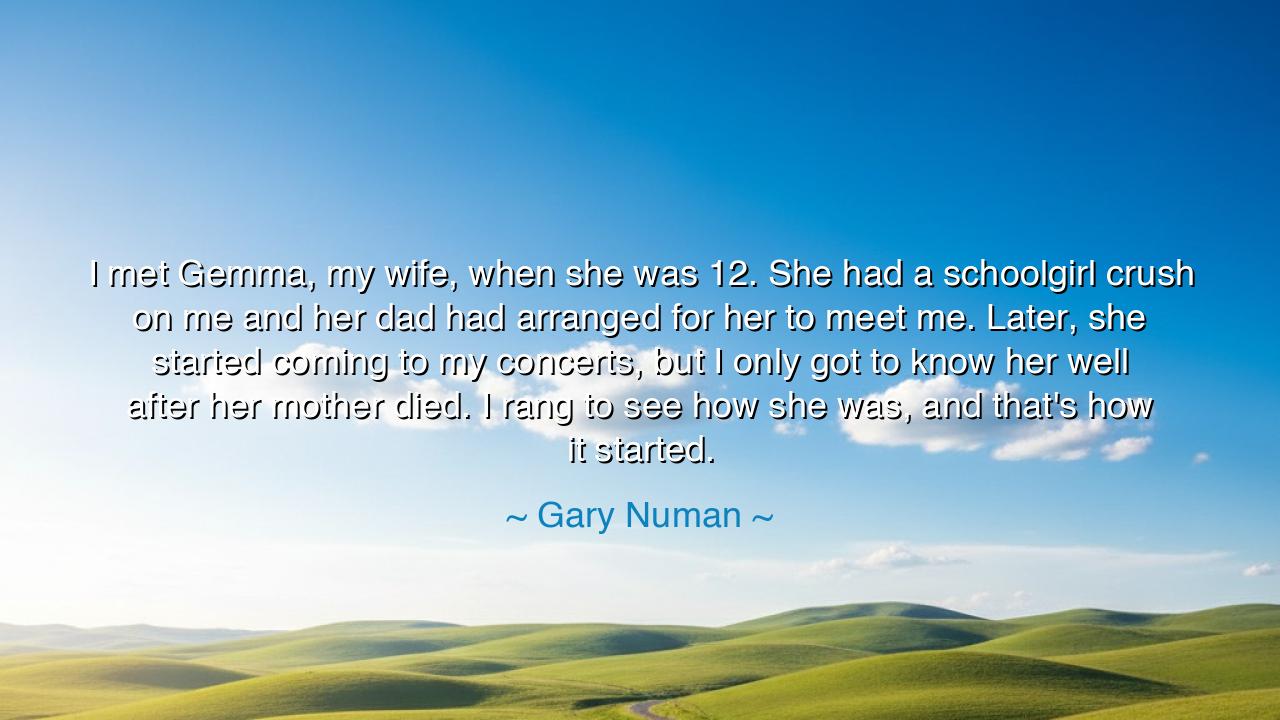
I met Gemma, my wife, when she was 12. She had a schoolgirl crush
I met Gemma, my wife, when she was 12. She had a schoolgirl crush on me and her dad had arranged for her to meet me. Later, she started coming to my concerts, but I only got to know her well after her mother died. I rang to see how she was, and that's how it started.






In the words of Gary Numan, “I met Gemma, my wife, when she was 12. She had a schoolgirl crush on me and her dad had arranged for her to meet me. Later, she started coming to my concerts, but I only got to know her well after her mother died. I rang to see how she was, and that's how it started.” These words, tender and unguarded, speak to the quiet mystery of love’s unfolding — how it does not always arrive like thunder, but rather like dawn: slowly, softly, until its light fills the heart. Numan’s reflection is not about sudden passion or grand romance, but about the fateful intertwining of lives, where care becomes connection, and compassion blossoms into something eternal.
The origin of this quote lies in the true story of Gary Numan’s own life — the famed musician who, beneath the steel and synthesizers of his public persona, lived a story of love that grew out of friendship and empathy. He met Gemma O’Neill when she was a young girl who admired him from afar, her heart captured by his music and mystery. Years passed; their paths crossed again in a moment not of glamour, but of grief — after her mother’s passing. In that moment of sorrow, Numan reached out, not as a star to a fan, but as one soul to another. And from that simple act of kindness — a phone call to ask, “How are you?” — began the story of their love, a bond that has endured through decades of fame, challenge, and quiet devotion.
In the ancient way of thinking, this story would not have been dismissed as coincidence, but understood as destiny’s gentle hand. The Greeks called it moira, the portion of life allotted by the fates. They believed that souls sometimes meet long before they are ready to recognize one another — that fate weaves its threads long before love takes form. So too, in Numan’s words, we hear the echo of this ancient truth: that what is meant to be often begins in silence, waiting for the moment when two lives are ready to meet as equals. Love that endures is seldom born of impulse; it grows from understanding, from shared vulnerability, from the courage to care when no one is watching.
Numan’s story reminds us that love often reveals itself through compassion. When he called Gemma after her mother’s death, it was not romance that guided him, but empathy. Yet in that simple gesture, something greater was awakened — a tenderness born of shared humanity. The poet Rumi once wrote, “The wound is the place where the light enters you.” So it was here: out of the wound of loss, light entered both their lives. It was not through passion’s blaze, but through kindness’s flame that love took root. Such love is deeper than desire; it is the meeting of souls that recognize in one another a safe place to rest.
In this story, we also see how time is love’s greatest teacher. The ancients said that nothing beautiful is born in haste. The oak that stands a thousand years begins as a seed, slow to sprout, yet steadfast once it grows. Likewise, love that matures over time becomes strong enough to endure storms. Numan and Gemma’s love did not spring from chance or infatuation; it evolved from years of knowing, from patience, from shared history. In this way, their story mirrors the eternal pattern of true affection — love that deepens not through drama, but through steadfastness.
There is also humility in Numan’s recollection. He does not speak as a man boasting of conquest, but as one marveling at life’s quiet design. His words reveal gratitude more than pride — a recognition that love came not when he sought it, but when he was simply being kind. It is a reminder to us all that love often enters our lives when we are not chasing it. We find it in the act of caring, in the reaching out, in the willingness to be present in another’s pain. For love is not a hunt, but a harvest — it grows where compassion has been sown.
The lesson, then, is profound and enduring: do not rush the unfolding of love, nor overlook the power of small acts of care. Sometimes, the greatest relationships are born not of passion’s fire, but of kindness’s warmth. Reach out to others not with expectation, but with sincerity; listen when life places someone in your path, for you may not yet understand the purpose of that meeting. Love, when it is true, will arrive in its own time, in its own way — and when it does, it will be rooted not in fantasy, but in truth.
So remember, O listener: love is not always the thunderous arrival of fate; it is often the quiet turning of life’s wheel. In the story of Gary and Gemma, we see that love begins not in perfection, but in compassion. The heart that learns to care deeply learns to love truly. Let your kindness be your calling card, your patience your strength, and your faith in timing your comfort. For one day, when the moment is right, love — ancient and enduring — will find you as it found them, softly, sincerely, and forever.






AAdministratorAdministrator
Welcome, honored guests. Please leave a comment, we will respond soon